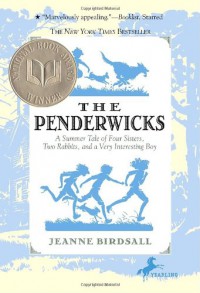Vilja Reads
I'm a student, so I don't have nearly as much time for leisure reading as I'd like. If I manage to read an entire course book instead of just the assigned chapters, I'll review that here, too.
Ympäristön tila ja suojelu Suomessa

Hyvä tietopaketti sinänsä, mutta tappavan tylsää tekstiä. Ilmiöitä käsiteltiin yleisesti, jotta kaikki tarvittavat aiheet saatiin mahtumaan sivumäärään, mutta mistään ei opittu niin syvällisesti, että sitä olisi varsinaisesti oppinut ymmärtämään. Lopputulos tuntuu tietokirjamaiselta - lista ilmiöistä ja ongelmista, joihin ei sen enemmin perehdytä.
Roads and Crosses (Wolf House #2)

Can you live with the knowledge that you're a monster? Can you live when you know there's no place to hide from a sickness in your own head?
The second Wolf House novel follows vampire hunters and indie rock stars Lily and Will, and makes you less inclined to ever become a vampire hunting indie rock star. It unravels more of their stories, and of the stories they connect with - Jay's, Bette's, Rose's, the kids the first novel left at the mercy of wolves. Lily and Will were supposed to be the heroes who rescue them, but that doesn't happen in a novel like this. They've got problems of their own, and being a hero sometimes just means that when you fail, you fail big.
How do you like it so far? Rubbish!
I apologize for the Morecambe and Wise quote in the subject line. You could argue that one can never have too much Morecambe and Wise, but it's not really appropriate for the content.
I've only just created my BookLikes account yesterday. It doesn't look that way, but that's because I imported all my old entries from GoodReads. So what's my impression so far? Mostly positive. I love that the blog is rather obviously a blog, that reviews are blog posts and can be tagged, and the general look and feel.
I don't like it asking me to sign in with Facebook, but it's not like GoodReads doesn't, or that every book page is linked to Amazon in such a visible way (dollar signs on my hobby blogs are always a slight stylistic turn-off, and Amazon isn't the only bookseller out there), or the fact that I can't seem to find a search field for searching my own reviews. BookLikes also seems to have fewer books in registry, or at least with cover images, than GoodReads.
But that's all basically fine. Sites need to make their money, and the comfortable interface and sense of novelty are still making this all a pleasure. But here's a really creepy thing that happened: Apparently BookLikes decided to MAKE my account follow a number of random BookLikes blogs. Not even official BookLikes blogs, just random users.
What. The lump.
I've unfollowed the lot, but it's made me rather suspicious of the site. Not cool, BookLikes, Not cool.
I'll let it pass, since it's probably just something they do to newbies, but if this happens again, I'm out of here.
Origins and Overtures (The Wolf House #1)

What do teenagers and vampires have in common? More than you'd think.
Mary Borsellino plunges straight into the world of YA vampire fiction, with human-vampire romance, misfit kids, rock bands and anachronistic glamour, with a few distinctions:
- the romance is mostly queer
- the kids are not all right
- nobody is nice
- heroes fall
- falling for the sexy vampire is really, really bad for you, I mean, oh my god, don't do it
Teenagers really are the author's forte, and there's nothing either condescending or idealized in her depiction of what life if like somewhere between childhood and adulthood, dealing with a bad world that you have no power in. Vampires fit in. No, they really do. If you don't want to grow up into the only kind of adulthood available, and you don't want to die - why not?
Origins and Overtures is the first of the five novels that make up the Wolf House series. As such, it does have the feel of a first part - there is no resolution and very little plot, with an overabundance of named characters. What elevates it is the tone, the style, the characterization, and the delicious sense of being in the moment with those characters, whether it's horrifying, mundane, or satisfying. For me, it was also a pleasure to read about queer kids and unhappy kids who do self-destructive things that make no sense, and of outsiders who love each other and protect each other.
On a very personal level, a minus was the character of Blake, the vampire who begins a kind of a relationship with teen-aged human Jay. Granted, Blake was not meant to be nice, but he was so not nice that I kept wanting to stop reading. I loathed him. Still do. One of the most aggravating things about him was that Jay adored him, as if Blake's smug self-centeredness was attractive to him. This was, as it turns out, in keeping with Jay's character, but that kind of a relationship is no fun for me to read about, and it just gave Blake something else to be smug about. I really, really can't stand Blake, to the point that I think he is the reason I still haven't managed to finish the series. Even when I'm loving everything else that's going on, there's always the danger that the next page will feature Blake.
Suomi öljyn jälkeen

Käytännönläheinen ja selkokielinen kirja öljyhuipun merkeistä ja vaikutuksista, joskin ratkaisuehdotukset ovat jotensakin kirjoittajien oman alan ja aseman värittämiä. Erinomainen tiedonlähde koskien öljyn saatavuutta ja energiavaihtoehtoja.
Family Affair

It's very rare that I don't finish a novel, even a bad one. After the first page I was still giving Family Affair a chance; after the fourth, I was only reading so I could say I knew what I was talking about when rating it (some novels do pick up towards the end); at about one fifth into the book I was done.
It was not just the erratic punctuation, the clunky sentences, the one-dimensional characters, or the Ikea erotica. It was a little bit how she was obviously writing her own writing into her writing by making her protagonist a writer and a member of a writers' group, but mainly it was how the text spent ages on trips to the pharmacy and worrying about dinnerware, while a life-changing decision and a proposal get half a page each.
That was too much. This novel did what not even Midshipwizard Halcyon Blythe or The Snow-Kissed Bride could do, and forced me to put it down. And this novel won an award? It didn't even seem to have been edited!
Call me unfair, for being so harsh without having finished the novel. It's true, I don't know what I'm talking about, but I just couldn't go on further.
Maxine Mainwaring, Lesbian Dilettante
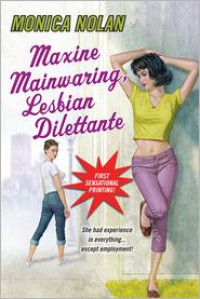
The third installment in Monica Nolan's Lesbian Career Girls series continues as lighthearted and fondly nostalgic as the previous two, also repeating the crime mystery plot that carried the previous novels. While familiarity with Lois Lenz, Lesbian Secretary is not necessary for reading this installment, it's more clearly a follow-up to it than Bobby Blanchard, Lesbian Gym Teacher, having virtually the same cast of characters with only a few additions and a different focus.
Maxie's tastes range from girl to girl and job to job, with little attention span for any of them beyond novelty. Occasionally I felt she could have tried a little harder to stop the corruption she unveils, find out the danger threatening her, and get to work on time, but it all works out in the end. It's a comforting idea that anybody, even Maxie, can find a perfect career.
Nolan novels are always a joy for me, since they're all about queer women in a way you simply don't see in most fiction. They're also very easy to read and filled with period detail. Even trying very hard, I can only find a couple of things to criticize:
1. Race. Making all Bay City gangs Nordic in origin makes sense since immigrant groups often do form special interest groups which can develop into gangs, but I get the feeling they were an easy target to present as evil immigrants, being whitest of the white and not usually stereotyped as gangland material. It might be a good thing, or it could be a case of intentionally avoiding the topic of racial tensions. Netta's civil rights campaigning happens in another city, and all speaking roles in the novel are left to white characters. I get the feeling Nolan might be easing into a 60s lesbian pseudo-pulp with a black/white pairing, but we're clearly not there yet.
2. I don't think Mänvaarik is a name in any language, and certainly not Finnish. I might have believed Estonian, but I'm guessing that's just because I don't speak Estonian. This was the second time this week that someone in the American-produced media I'm consuming used prejudice against Finns as an example of a silly kind of racism, and I just feel gratified that people remember we exist. Small nations take pride in small things.
3. The habit of using an adjective-job description combination such as "the perky office manager" or "the disappointed recreational aide" to refer to people was annoying at first, but overuse eventually made it amusing. On the whole, though, I find it preferable to use a character's name, unless you specifically want to point out that this person is a secretary and currently distraught.
Gosh, but I just keep finding things to love about the novel. Here are some:
- Maxie's relationship with her mother is hostile and doesn't much improve towards the end, which I find refreshing, awash as I have been in really-truly-secretly-loving family stories; Maxie feels kinship with her mother, but doesn't expect them to ever be friends.
- The tour of the different types publishing businesses from a grassroots newsletter through sleazy "sociological" novels to the high-end of socialite gossip rags was illuminating and exciting.
- Did I mention that it's all about women? It's all about women. All sorts of women. Women are bad guys and good guys and agents and publishers and reporters and gangsters and business owners and lawyers and socialites, and they are the point. No man comes to the rescue, no man is behind it all, no man is the point of the story. Oh, and practically everyone is a lesbian. It is incredibly relaxing.
So, if you're like me, this novel comes highly recommended. If you're not like me, you probably gave up at the description.
A Brighter Spark
 A Brighter Spark manages to be both perfectly ordinary and thoroughly revolutionary, in that it's a story of a woman who meets a man and they date and fall in love, and it's a romance novel in which people are fallible, responsible, kind to each other, and recognizable people... I'll just cut to the chase: the hero is not a douchebag.
A Brighter Spark manages to be both perfectly ordinary and thoroughly revolutionary, in that it's a story of a woman who meets a man and they date and fall in love, and it's a romance novel in which people are fallible, responsible, kind to each other, and recognizable people... I'll just cut to the chase: the hero is not a douchebag.Repeat: The hero is not a douchebag.
For some of you that might make it a must-miss, I don't know, but Daniel is sweet and considerate and doesn't try to take Suzy to places she isn't ready to go. He's not mean to her and she doesn't want him to be. The only things scaring Suzy in this novel are whether, despite being a mother already, she's ready to be a grown-up in a grown-up relationship -- and of the possibility of getting hurt. But it's worth it for the sake of feeling alive again, which is what falling in love with Daniel gives her.
There are other little rebellions: Suzy's rant against the women's magazines, her unashamed sexual drive, her friendship with the father of her children who also happens to be in a relationship with another man. It's like -- and I'm pretty sure this is what happened -- the author read a romance novel and thought "Let's fix this shit."
It's not my favourite genre and it's still a problem that falling in love doesn't make for a very solid plot on its own, but as a piece of sweet, reassuring fiction, like a hug and a pat to tell you it's all going to be alright, it might be just what the doctor ordered.
Ruby Coral Carnelian
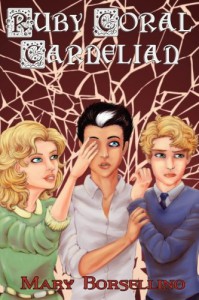 Del, the wizard's apprentice, has known for a while that he needs to make a decision, if he wants to live: run away, or kill his master. He didn't plan on companions.
Del, the wizard's apprentice, has known for a while that he needs to make a decision, if he wants to live: run away, or kill his master. He didn't plan on companions.There are transformations, brushes with myths, stories that turn out to be closer than skin. Del helps Kelsie and Nicholas, his master's stepchildren, to break away from a cruel spell, then to take their revenge; shares with them his magic. He doesn't expect them to stay. Friendship doesn't mean much when the people hunting you, who want to cut you into pieces, can whip a hurricane out of a gentle breeze, or craft barriers of searing pain. The twins have a soft life to go back to; he never did. He doesn't expect to come out of this alive.
This novella is part a dark version of a children's adventure, part fairytale, and both of those more than it's fantasy YA, though that's what it will probably be slotted into as genres go. It excels in telling without telling, letting us fill in a world with a history around details that come up as they become relevant.
The description of emotions is similarly constrained in places even as the stakes are high and losses, terrors and actions extreme as the kids are pushed to the limit of endurance. Del, whose point of view we follow, tries not to feel very much, since most of what seems available to him to feel is bad; and feeling something good might be potentially even worse, considering what he'd then have to lose. Until the very end I never even realized I was reading an emotional journey, aside from a story of developing friendship. It's when that bubble of misery broke, even just a little, that I saw it, and the difference was enormous.
The fantasy here is the act of leaving, of cutting free, and finding a home that isn't a place.
Broken Slate
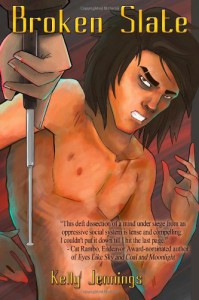 An abuse narrative and an analysis of privilege and hierarchy, very well written, but somewhat frustrating and drawn-out.
An abuse narrative and an analysis of privilege and hierarchy, very well written, but somewhat frustrating and drawn-out. (SPOILER WARNING)
We know there is a revolution and it's likely Martin will join it, but the novel is only concerned with a series of tortures and opportunities that push Martin to that point, while showcasing the system and the setting. I would be more upset by this if I didn't know this was a trilogy. I'll consider it the first act, and reserve further judgment until after I've read the whole thing.
The Bridgeman (Emily Taylor Mystery, #1)
 This novel was actually recommended to me -- probably because I asked for female sleuths -- so obviously I may be alone in disliking it as much as I did. Give it a go if you must, but only if you like pulp fiction and sniffling heroines.
This novel was actually recommended to me -- probably because I asked for female sleuths -- so obviously I may be alone in disliking it as much as I did. Give it a go if you must, but only if you like pulp fiction and sniffling heroines.
Being Emily
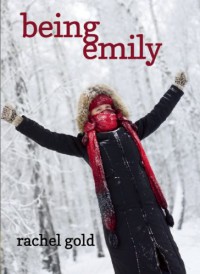 A very typical narrative of coming out and beginning transition, down to the "always knew" and "wants surgery", but well-written and written with compassion, if a little too much centering on the feelings of Emily's cis girlfriend. Let this also work as a warning: For most of the novel, Emily is constantly misgendered in pronouns when the novel shifts to Claire's third-person narration, to the point that calling her "she" and "Emily" is actually rare, despite her womanhood being the very subject of the novel.
A very typical narrative of coming out and beginning transition, down to the "always knew" and "wants surgery", but well-written and written with compassion, if a little too much centering on the feelings of Emily's cis girlfriend. Let this also work as a warning: For most of the novel, Emily is constantly misgendered in pronouns when the novel shifts to Claire's third-person narration, to the point that calling her "she" and "Emily" is actually rare, despite her womanhood being the very subject of the novel.Certain Dark Things

Decent police procedural, decent romance, a little fluffy around the edges. Basically a Law & Order femslash fanfic. Numbers filed off or not, I can't tell, but I still think that's an apt description. Nonetheless, it was a deliciously enjoyable read.
The Princess Affair

Princess Alexandra, Britain’s second in line for the throne, is known in the tabloids as “Sassy Sasha” — the party girl socialite with a temper and a wild streak a mile wide. Kerry Donovan is a hard-working footballer and American architecture student in Oxford on the Rhodes scholarship. They meet, sparks fly, and suddenly the princess is teetering on the edge of the biggest media shitstorm in recent memory.
I love the subject, as it promises delicious high life fantasy and a high stakes setting. Sadly, this just wasn’t very well written, despite the author’s obvious passion for literature and Oxford.
I would have forgiven a lot just for the subject matter, but even with my rosiest of glasses on… no.
There were parts that swept me up! The anticipation just before you KNEW (it was quite predictable) the lesbians would hit the fan was exciting! The description of Balmoral Castle and the grounds, as well as Kerry’s first day at Oxford, were evocative. And yet… no.
The sex was kind of hot, aside from moments of disconnect when Kerry’s body was described in masculine terms, making me momentarily suspect the novel of being het with the male filed off. But… no. No, it was probably never het, but also just… no.
Kerry’s all right when she’s on her own or with her gay male friend Harris. She is refreshingly nice for someone so masculine-coded in a romance novel. However, I can’t stand her chivalry when she’s around Sasha. Maybe it’s not meant that way, but chivalry, whoever the culprit, seems just subconsciously condescending to me — let’s protect the little femme, despite the fact that she’s not only powerful because of her position but also her personality, because — femme! Kerry’s musculature is also described rather fetishistically, but maybe that’s only a minus because I’m not into it.
Sasha was, at her best, an interesting and nuanced character, and the difference between how her actions appear and what they were motivated by is palpable without making those actions illogical within the confines of her characterization. At worst, she seems split, as if the author was trying to write two characters at the same time. To be fair, that was part of the character’s composition and conflict — the split self image and the insecurities it brings.
The love story suffered from something that’s a problem with a lot of category romance novels: that “falling in love” is not a plot, and trying to stretch it out over a minimum of 50,000 words is not going to be easy, especially without a another plot to carry it, no matter how lush and interesting the surroundings. They have “incredible chemistry”, they “spend time together”, they “come to appreciate each other” and “can’t stop thinking about each other” but they don’t actually have much conflict, other than that they both know this is a stupid idea, and they have to do it all by sneaking around.
In conclusion, I liked bits of it but all in all it was not really worth it.
Beebo Brinker
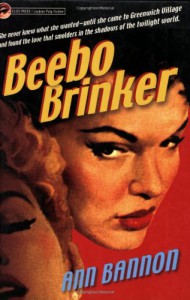 While any cover tagline using phrases like “the love that smoulders in the twilight world” seems to promise cheesy fun, this — like many other lesbian classics — is instead an earnest novel that tries to dip into the good and the bad of being gay in America the 1950s and ’60s, and ask for understanding.
While any cover tagline using phrases like “the love that smoulders in the twilight world” seems to promise cheesy fun, this — like many other lesbian classics — is instead an earnest novel that tries to dip into the good and the bad of being gay in America the 1950s and ’60s, and ask for understanding.This is a hard novel to rate, since it’s both a bit of history, escapist entertainment, a “straight” novel, and a romance genre novel, though much less that than it was straight. But I don’t rate for impact or worn-off novelty. In short: points awarded for characterization and interest, points deducted for cliche and easy escapes.
-
Note: There are several pirated versions of Ann Bannon’s lesbian classics being sold as e-books on Amazon.com. They are still in copyright and the only legitimate copies are published by Cleis Press. Now you know.



